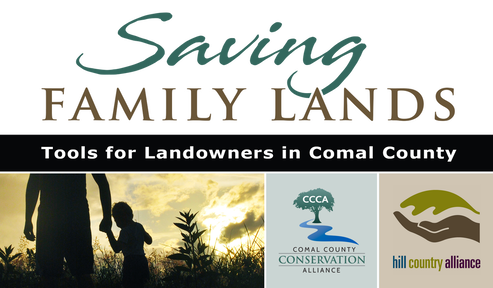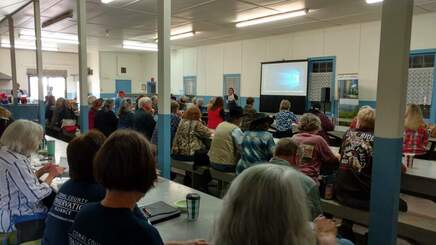RWFM Stewardship Webinar Series
Saving Family Lands: Challenges & Opportunities for Working Land in Texas
|
Texas is losing rural land at a faster rate than any other state. With over 1 million acres of working lands having been lost between 1997 and 2012, many landowners are seeking a means to protect their land from a similar fate. This presentation will begin with an overview of current land trends in Texas using data compiled by Texas A&M Natural Resources Institute’s Texas
|
Land Trends Study, and will suggest the use of agricultural conservation easements for facilitating permanent protection of working lands and their associated legacies. Options associated with conservation easements and the processes involved with their development and implementation will be discussed in detail.
|
Hill Country Landowner Workshop — Fall 2020
Listen and learn from regional experts on land stewardship tools and financial resources, conservation easements, and what to expect in terms of eminent domain and other rural landowner issues in the upcoming legislative session.
This half-day, virtual workshop was recorded during the Fall 2020 Hill Country Landowner Workshop on October 2, 2020 and was co-hosted by the Hill Country Alliance, Hill Country Land Trust, and Texas Land Conservancy.
PRESENTATIONS BELOW:
This half-day, virtual workshop was recorded during the Fall 2020 Hill Country Landowner Workshop on October 2, 2020 and was co-hosted by the Hill Country Alliance, Hill Country Land Trust, and Texas Land Conservancy.
PRESENTATIONS BELOW:
|
Video 1: Land Stewardship with Steve Nelle
Video 3: Tax and Financial Considerations of Conservation Easements with Kathryn Tancig & Margaret Menicucci
Video 5: Landowner Discussion Panel on Conservation Easements
|
Video 2: Key Issues for Rural Landowners and Ranchers with Jim Bradbury
Video 4: Financial Cost-sharing Opportunities for with Shane Kiefer
Video 6: All sessions
|
CCCA & HCA Host "Saving Family Lands" Workshop in Comal County
Spring Branch, Texas
February 2019
February 2019
|
The Comal County Conservation Alliance (CCCA) and the Hill Country Alliance co-hosted the workshop, “Saving Family Lands: Tools for Landowners in Comal County,” on February 15, 2019 at the Anhalt Dance Hall in Spring Branch, Texas.
The one-day workshop, which highlighted financial and conservation tools available to rural landowners in fast-growing Hill Country counties, attracted ninety attendees. The workshop was designed to provide farmers, ranchers, and other landowners with effective tools and resources to help them address issues inherent in passing family land on to future generations. Speakers presented on a variety of topics including the case for conservation in Comal County; wildlife and open space valuation; financial tools and programs for landowners; conservation easement basics and tax benefits; and the role of land trusts. The workshop ended with a panel discussion with local landowners and conservation easement donors. The presentations generated many questions from the audience. “With rates of land development and subdivision booming in Central Texas, workshops like this one provide a critical service to landowners interested in protecting their land and handing on a conservation ethic to future generations,” said Katherine Romans, executive director of the Hill Country Alliance. Attendee Steve Hixon said, “It was an excellent landowner workshop. We got very useful information on conservation easements to help protect our family ranch for future generations.” “The event featured well-informed speakers who covered a wide range of topics related to land conservation--from the basics of a conservation easement to tax advantages,” said attendee Martha Bersch. “The information will be valuable in my family’s discernment regarding the future of our land.” |
“It was encouraging to see so many people interested in preserving their land,” Elizabeth Bowerman, President of CCCA, said. “Some families in our county live on land that has been in their family for six or seven generations!
These lands are an important part of the culture and the rural fabric of our area, and the CCCA is happy to be able to help these ranchers and landowners find ways to preserve their land for future generations.” The workshop was conducted with assistance from Alamo Resource Conservation & Development Area Inc., Anhalt Hall, Blair Wildlife Consulting, Braun & Gresham Family of Companies, Guadalupe-Blanco River Trust, Hill Country Land Trust, James D. Bradbury PLLC, Plateau Land Group, Plateau Land & Wildlife Management, Ranch Connection LLC, Texas Parks & Wildlife Department, Texas Wildlife Association, U.S. Department of Agriculture, and Wimberley Valley Watershed Association and facilitated by Carolyn Vogel, Texas Conservation Connection. The Comal County Conservation Alliance is a nonprofit organization working to protect land, water, and wildlife in Comal County. The Hill Country Alliance is a nonprofit organization whose purpose is to raise public awareness and build community support around the need to preserve the natural resources and heritage of the Central Texas Hill Country. | ||
PRESENTATIONS BELOW
| Chris Abernathy Texas Parks and Wildlife Department “Texas Farm and Ranch Lands Conservation Program” |
| James Bradbury PLLC “Conservation Easements in Texas” |
| Carrie Kasnicka Guadalupe-Blanco River Trust “Land Trust 101” |
| Shane Kiefer, CWB Plateau Land & Wildlife Management “Introduction to Wildlife Management Property Tax Valuation” |
| Margaret Menicucci Braun & Gresham Attorneys at Law “Conservation Basics & Income and Estate Tax Benefits” |
| Daniel Oppenheimer Hill Country Alliance Presentation |
Landowner Resources
Discover Landowner Assistance Opportunities
Federal and state agencies offer a variety of voluntary assistance programs that help private landowners manage their land sustainably. Explore the tool below to learn how these resources may meet your current needs. You can filter the table by category, benefit type, and location. Go to there website to learn what resources may be available to you.
Federal and state agencies offer a variety of voluntary assistance programs that help private landowners manage their land sustainably. Explore the tool below to learn how these resources may meet your current needs. You can filter the table by category, benefit type, and location. Go to there website to learn what resources may be available to you.
Agricultural Conservation Easement Program (ACEP)
The Agricultural Conservation Easement Program (ACEP) provides financial and technical assistance to help conserve agricultural lands and wetlands and their related benefits. Under the Agricultural Land Easements component, NRCS helps Indian tribes, state and local governments and non-governmental organizations protect working agricultural lands and limit non-agricultural uses of the land. Under the Wetlands Reserve Easements component, NRCS helps to restore, protect and enhance enrolled wetlands.
Farming Assistance for Veterans
Access to Capital, Land and More – USDA can help veterans transition into farming, ranching, and other agricultural opportunities by connecting you with financial, educational and training resources, and business planning support.














